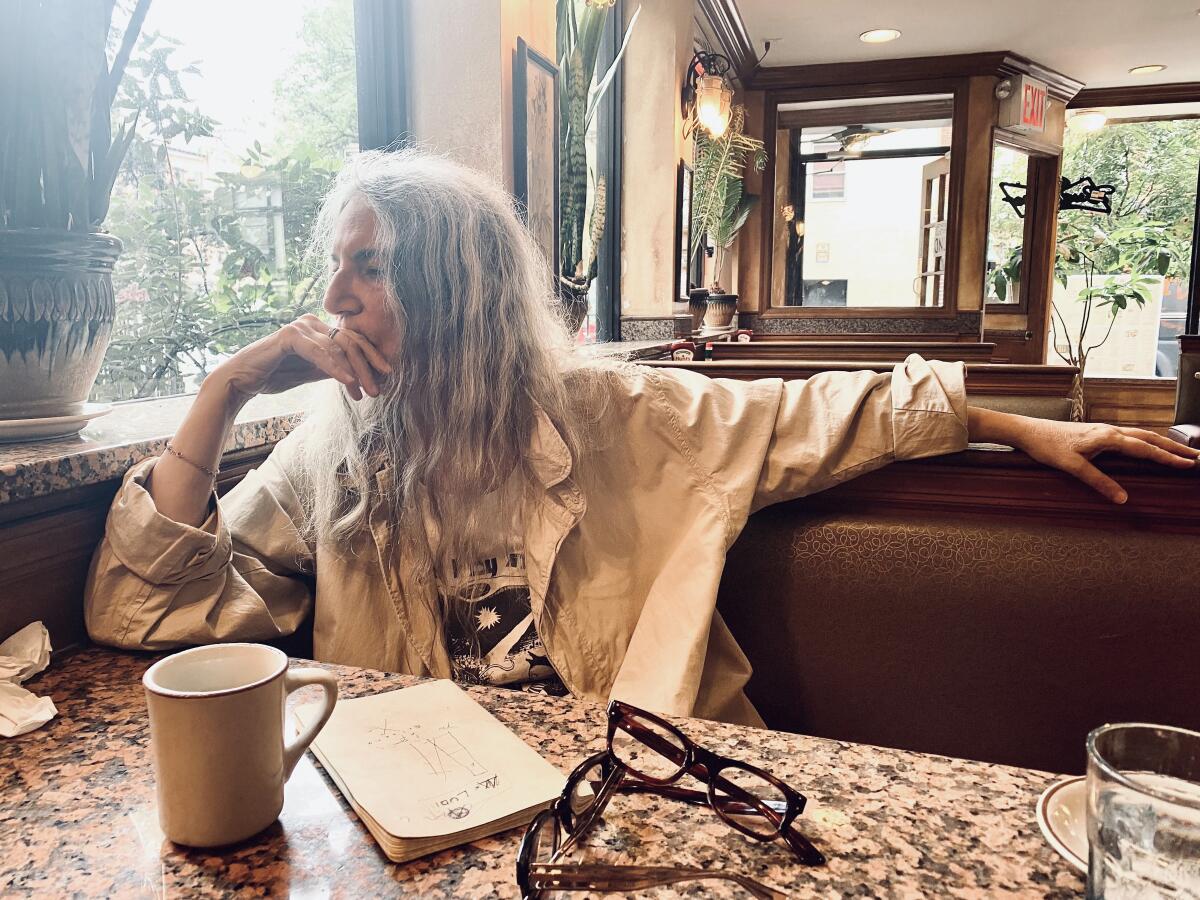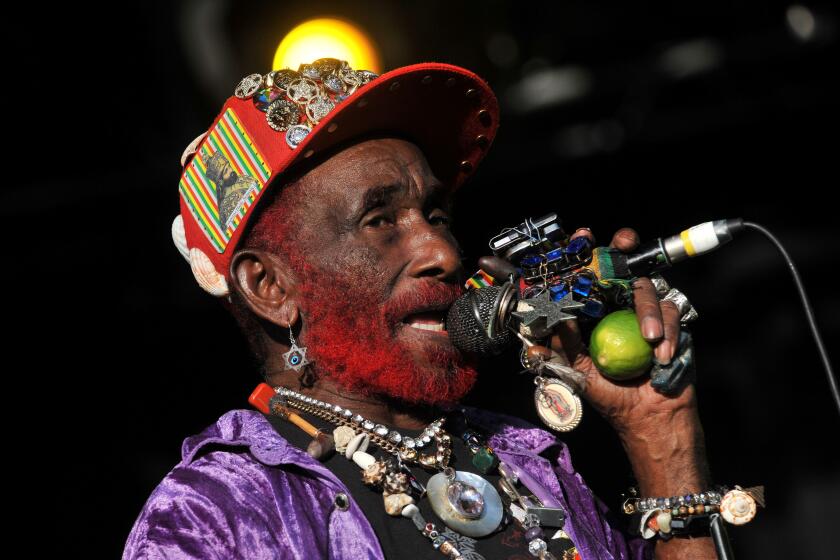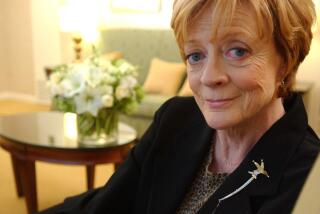Grounded by COVID, Patti Smith joined Substack and Instagram. But nothing replaced playing live

The last time Patti Smith performed in Los Angeles was March 6, 2020, at the Walt Disney Concert Hall. COVID-19 was a dark cloud hanging over our heads. Smith was her motherly self, urging the audience to be safe but also not to give in to “the disease of stress,” as she led not one but two renditions of her anthem “People Have the Power.” For many in the audience, it was a moment of communal affirmation and celebration in a politically toxic time. For Smith it was the beginning of what was supposed to be a world tour. Until all the world’s stages went dark.
“That was a joyous concert,” the musician, author, photographer and 74-year-old Instagram influencer said in a recent phone interview. “The next two shows were in San Francisco at the Fillmore, and they were explosive, and I really felt strong. Then everything changed.”
For Smith — whose work ethic has led to some of rock’s most iconic albums as well as multiple volumes of verse, prose and artwork, including an award-winning memoir — pulling the pandemic emergency brake didn’t just plunge her into seclusion; it inflicted a sort of whiplash.
“I don’t have a problem being on my own, I work well in solitude,” she said. “When I’m writing, I like being on my own. But in order to tour, I shift my consciousness out of my dream world state toward being engaged in the world, to being social. To shift my whole consciousness back toward isolation was a shock to my system.”
Lee “Scratch” Perry, who produced landmark recordings for Bob Marley and helped invent dub music at his famed Black Ark studios, died Sunday at age 85.
She eventually managed to turn her derailing into new routes of expression. A diary, a relocated cafe table, an elderly cat, family and digital media helped pull her through. She is slowly, tentatively, back in motion again, playing live shows, including concerts at Pappy and Harriet’s in Pioneertown, on Tuesday, and the Ford, on Thursday and Friday.
Last week, she dropped a surprise EP of songs recorded live at Electric Lady studio in New York, part of the studio and Spotify’s “Live at Electric Lady” series. It’s her first audio release in nine years.

Speaking from her apartment in New York’s Greenwich Village, the Rock and Roll Hall of Famer admits to feeling “rusty” at interviews and at “socialization” in general. Then again, it’s not the first time Smith’s work has been put on pause; she named her 1996 comeback album “Gone Again” for a reason.
In the 1980s, she largely stopped performing to raise her two children, Jackson and Jesse Paris, with her husband, Fred “Sonic” Smith of the band the MC5, in Detroit. Years before that, a fall from a Florida stage left her with a broken neck. Now, once again, as she famously said after that accident, she’s “out of traction and back in action.”
Born in Chicago and raised in New Jersey, Smith first became known in downtown New York for reading incantatory poetry accompanied by Lenny Kaye’s electric guitar. With her Keith Richards hairdo and Jersey rasp, she was a singular figure whose raw power helped forge the iron of punk, but whose wide-ranging intellect has long since transcended genre or medium.
Her 1975 tour de force debut, “Horses,” was ranked the 26th best album of all time by Rolling Stone. Her 2010 autobiography, “Just Kids,” about her early years in New York with her roommate Robert Mapplethorpe, won the National Book Award. She is also a respected photographer, a skill that helped make her a natural fit for Instagram. More than perhaps any of her musical peers, she has proved adept at multiple creative endeavors.
But in March 2020, all that work came to a screeching halt. For Smith, touring isn’t just about playing shows: Travel is her muse. Her recent books, “M Train” and “Year of the Monkey,” take place in trains, cafes, beaches, hotel rooms and museums in Japan, Germany, Mexico, California, etc. They are portraits from and of a woman in motion, a punk heiress to Doris Lessing and M.F.K. Fisher.
“I don’t write well in my domestic situation,” she said. “On the road, I don’t have to do all of the things that I do at home: cooking for myself, doing the laundry, taking care of the cat and the litter boxes. These are all regular human things, but they are not conducive to the way that I like to work. I don’t like being rooted when I work. I write on trains, and in cafes. I’m more ready to write in an obscure cafe in Oslo than at my own desk in New York City. So I was quite restless the first couple months. I wasn’t that productive. … Truthfully, I was like a wolf circling about. I would get up at 3 in the morning and just pace.”
Smith was so desperate to get out of the house that, for a while, she sat in her favorite Manhattan cafe with a coffee while the workers were preparing the morning to-go orders. “I was like the acting manager,” she said. When that was no longer possible, the cafe let her move a table and chair to her home. “I made my own little atmosphere.”
Eventually, she began pouring her pandemic observations into a journal. “That little diary was really sort of a salvation for me.”
A few months ago, Smith began publishing those writings, dubbed “The Melting,” as part of a weekly Substack newsletter, where she also publishes video and audio from the occasional song and other written snippets. “Working on Substack was very good for me, because it gave me a job to do, and a job that I have to be extremely attentive to.”

Smith was mostly alone in New York. Her cat and her daughter were her primary companions. “Jesse really provided me with so many things: companionship, laughs, supplies,” she said. “We almost look at this time nostalgically because, really, there was nobody else.”
It was Jesse who suggested her mother start an Instagram account, This is Patti Smith. The septuagenarian took to the format quickly, posting snapshots of her life — books, friends, family, set lists — and video performances with captions that inevitably begin, “This is …”
“I wasn’t quite sure what you did on Instagram, but I thought now I can take a picture and write a little message to people,” she said. “My daughter was my first follower.” She now has 949,000 others.
The caged wolf was finally released this July, when she flew to Italy. But her first show with her full band on Aug. 6 in Evanston, Ill., was cut short. The band was playing their seventh song, Bob Dylan’s “A Hard Rain’s a-Gonna Fall,” prophetically enough.
“Doing that song now, where everyone’s had hard rain falling on them, everyone, it was very emotional. I was nearly in tears. Then, in the middle of the last verse, all of the sudden the wind started whipping, and my braids started flying around, and I saw part of the tent go up in the wind. We finished the last ‘hard rain’s a-gonna fall,’ and my tour manager ran on stage and said, ‘You have to leave now, they’re evacuating.’ I was like, ‘Goodbye!’ That was my reintroduction into performing.”

On Aug. 21, her set was again canceled when tropical storm Henri shut down the We Heart NYC concert in Central Park, denying fans a chance to see her perform “Because the Night” with Bruce Springsteen (with whom she wrote the song). Instead, her post-show live interview with CNN’s Anderson Cooper — where she pointed out that the earthquake in Haiti, the fall of Kabul and the Delta variant of the coronavirus might be more significant than a canceled concert — went viral on Twitter.
Perhaps, she joked in a subsequent conversation with The Times, her shows here in California can help with the drought. “Nothing makes me happier than to bring rain down in a place that needs it,” she said. “But New York didn’t need it.”
Son Jackson will be playing guitar with her at the Southland shows, as he has off and on for decades; they’ll be joined by longtime bassist Tony Shanahan. For many Patti fans, it may be their first live concert since that fateful evening at the Disney Concert Hall — a reunion of sorts.
“These aren’t rock ’n’ roll shows,” she remarks about the absence of a drummer, “but rock ’n’ roll is within me, so they won’t be devoid of rock ’n’ roll. I always believe that a night is what the people and whoever’s on stage make it.”
More to Read
The biggest entertainment stories
Get our big stories about Hollywood, film, television, music, arts, culture and more right in your inbox as soon as they publish.
You may occasionally receive promotional content from the Los Angeles Times.











